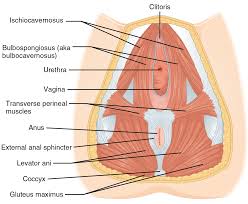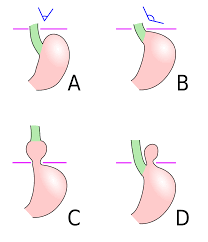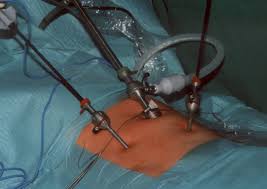CALL TODAY 646-846-1136 | EMAIL
Surgical Experts Dedicated to Improving Lives
At Lenox Hill Surgeons, our dedicated team of nyc surgeons and medical professionals provide compassionate care with the highest ethical & professional standards. In our state of the art facility, we offer surgical services using only the most cutting edge and current procedures and treatments.We specialize in general surgery, including extensive experience in performing hernia repair surgery. Our expertise is in minimally invasive surgery and robotic surgery. Minimally invasive and robotic surgery often allow patients to experience easier recovery than traditional open surgery. They also allow for more precise and less traumatic surgery. When robotic and minimally invasive surgery is not an option, we are also skilled and experienced in traditional open surgical procedures.
All of our doctors are experienced and skilled surgeons having undergone extensive training in school, residency and fellowships. They all practice medicine with ethical behavior, compassion and superb bedside manner. In the operating room they all exhibit precise mechanical abilities, analytical thinking and the ability to visualize tissue in three dimensions. These innate and learned skills allow our surgeons to be some of the most dexterous and skilled professionals in all of New York City and the Country.
Call us: 646-846-1136
About The Surgeons
PATIENT TESTIMONIALS
Recent Awards
We are honored and deeply appreciative to have consistently received prestigious awards and recognition year after year, establishing us as one of New York’s foremost hospitals for a wide range of general surgeries, safety measures, specialized procedures, and overall excellence in healthcare. At Lenox Hill Surgeons, our unwavering commitment lies in delivering exceptional care and unwavering support to our patients, guaranteeing their safety and successful recovery throughout their entire surgical experience.
Hospital Quality Awards
 America’s 50 Best Hospitals Award™ (2023, 2022)
America’s 50 Best Hospitals Award™ (2023, 2022)
Top 1% in the nation for providing the highest clinical quality year over year.

America’s 100 Best Hospitals Award™ (2021)
Top 2% in the nation for consistently delivering clinical quality year over year.

America’s 250 Best Hospitals Award™ (2023, 2022, 2021)
Top 5% in the nation for consistently delivering clinical quality.

Patient Safety Excellence Award™ (2023, 2022)
Top in the nation for providing excellence in patient safety by preventing infections, medical errors, and other preventable complications.
Specialty Clinical Quality Awards

America’s 100 Best Hospitals for Cardiac Care Award™ (2023, 2022, 2021, 2020, 2019)
Superior clinical outcomes in heart bypass surgery, coronary interventional procedures, heart attack treatment, heart failure treatment, and heart valve surgery.

America’s 100 Best Hospitals for Coronary Intervention Award™ (2023, 2022, 2021, 2020, 2019)
Superior clinical outcomes in coronary intervention procedures (angioplasty with stent).

America’s 100 Best Hospitals for Prostate Surgery Award™ (2023, 2022, 2021)
Superior clinical outcomes in prostate removal surgery and transurethral resection of the prostate.
Click to see all of our Healthgrades best doctors awards


Visit our main website at www.LenoxHillSurgeons.com
Blog Posts are Below:
Tag Archives: Hernia Repair Surgeon
What are the Symptoms of a Hernia?
 A hernia is a painful condition, so you no doubt want a quick answer to that question, “What are the Symptoms of a Hernia?” Unfortunately, this answer will greatly depend on your own assessment of yourself. In order to correctly identify a hernia, there are a few specific signs you should be looking for. If you are in intense pain and are seriously concerned, talk to your doctor. This article is solely intended to assist people dealing with minimal pain and are simply curious. It is not meant to be used in place of an accurate, medical evaluation.
A hernia is a painful condition, so you no doubt want a quick answer to that question, “What are the Symptoms of a Hernia?” Unfortunately, this answer will greatly depend on your own assessment of yourself. In order to correctly identify a hernia, there are a few specific signs you should be looking for. If you are in intense pain and are seriously concerned, talk to your doctor. This article is solely intended to assist people dealing with minimal pain and are simply curious. It is not meant to be used in place of an accurate, medical evaluation.
What is a Hernia?
In the abdominal cavity, the internal organs and structures are held in place by the abdominal muscles. Through typical use, the abdominal muscles, or abs, have a natural tension that can hold the contents of the abdominal cavity well. However, whether due to lack of use or overexertion, the integrity of the abdominal wall gives way and a small subsection of the intestines, or some other mass of tissue, protrudes out. This protrusion can potentially cause serious problems. For example, a hernia can lead to an intestinal blockage. This blockage is a serious issue and would require emergency medical attention.
The most important factor in the safety and recovery from a hernia is early identification. If closely monitored by a qualified medical professional from early on, the risk of hernia complication is greatly reduced.
Bulging
 One of the most commonly noticed signs of a hernia is bulging. Due to the very nature of how a hernia works, the affected area will bulge, creating a lump that is the hernia itself. Identifying this lump is one of the most important diagnostic tools available. The exact location of the herniated lump will vary depending on the diagnosis. In general, the hernia will be in the region after which it is named. An umbilical hernia, for instance, is located in the umbilical region at the belly button.
One of the most commonly noticed signs of a hernia is bulging. Due to the very nature of how a hernia works, the affected area will bulge, creating a lump that is the hernia itself. Identifying this lump is one of the most important diagnostic tools available. The exact location of the herniated lump will vary depending on the diagnosis. In general, the hernia will be in the region after which it is named. An umbilical hernia, for instance, is located in the umbilical region at the belly button.
A femoral hernia can be found in the inner thigh area. An inguinal hernia is a hernia in the groin. Surgical hernias can also develop at the site of a relatively recent surgical incision.
Swelling
Another diagnostic sign of a hernia is swelling. Although easily confused with the bulging mentioned above, swelling is a separate and distinct symptom altogether. Swelling involves more than just visible confirmation. Swelling of the affected area will also bring redness, warmth, and discomfort when touched.
Pain
The pain associated with a hernia is different than the pain caused by other means. When dealing with a hernia, the level of pain will vary depending on position and motion. For example, most people complain of greater pain when bending, lifting, or even coughing. The pain that hernias produce can vary from person a person, but typically is a dull ache in the region affected.
The difficulty with dealing with hernia pain is it the pain is not constant. Many times, people feel the intense pain that comes from exerting pressure on a hernia and schedule an appointment with a doctor. However, by the time they go to the doctor, it has been long enough that they forget the exact nature of the pain they’re dealing with this can make it difficult to relay necessary information to your doctor.
—
After reading this, do you think you have a hernia? Schedule an appointment with the best surgeons in NYC to develop a custom plan for dealing with your hernia.
Call Today: 646 -846-1136
———
References:
https://www.uofmhealth.org/health-library/aba5300
https://www.webmd.com/digestive-disorders/types-of-hernias#1
https://nyulangone.org/conditions/hernia-in-adults/types
https://www.mayoclinic.org/diseases-conditions/inguinal-hernia/symptoms-causes/syc-20351547
Causes & Symptoms of Hernias
Hernias are widely common, with almost 2% of the population suffering from hernias. This may seem like a small number, but in the United States of America alone that adds up to around 600,000 people dealing with hernias. But what exactly is a hernia? What causes so many people to have hernias? And how does having a hernia affect you?
What is a Hernia?
A hernia is a protrusion of soft tissue, usually an organ or fat tissue, through the muscular lining that typically would hold it in place. One of the most common types of hernias is an inguinal hernia. In this case, the abdominal muscles that hold the intestines in place can grow weak and develop gaps that allow a small section of the intestine to jut out. This segment of the intestine can eventually become swollen, painful, and cause discomfort during regular tasks.
Many people complain of pain associated with bending, lifting, and coughing, as all of these activities create pressure on the herniated section of the abdominal cavity. Although a hernia itself may not be hazardous initially, it can lead to many other medical complications.
What Causes Hernias?

When the muscular lining that keeps organs in place grows weak, the integrity of the muscular “wall” can fail, creating weak spots. These spots can then become susceptible to internal structures pushing out and herniating. This herniation typically happens initially during a period of intense pressure. For example, exerting oneself while lifting an object can cause pressure in the abdominal cavity and result in a hernia.
Prolonged, chronic coughing can weaken the structural muscles in place, with repeated strain reducing the integrity of the muscle. Additionally, a surgical incision, if not provided enough time to heal properly, can facilitate a weak spot in the muscular lining and allow for herniation.
Congenital problems can also result in herniation in cases where the abdominal wall does not fully develop in utero. There are a number of complications that can increase the risk of herniation. This includes pregnancy, heavy lifting, rapid weight gain, chronic coughing, constipation, and recent surgical activity in the surrounding area.
What are the Symptoms of Hernias?
The most commonly reported symptom of a hernia is pain. The exact nature of the pain experienced varies from person to person, but many people note greater pain when additional pressure is applied to the abdominal region. This includes lifting, bending, coughing, or other physical exertion with straining.
Hernias are not always found as soon as they occur. Usually, it takes repeated pressure and exertion for the hernia to be noted. After a number of years, a hernia is usually identified correctly by self-assessment. A hernia does not correct itself, but would instead require surgical treatment to repair the damage.
Complications of Hernias

Although a hernia on its own does not require emergency treatment, there are a number of situations in which urgent action may be required. Herniated areas may not receive the blood supply they require and are at a higher risk of infection. If a hernia has become swollen, warmer than usual, or extremely painful, this can be a sign of infection. In addition, depending on the location, a hernia can cause obstruction to the bowel and digestive tract. This can quickly become an urgent situation requiring emergency medical correction.
Do you think you might have a hernia? Call the best surgeons in NYC to discuss your case and your treatment options.
———
References:
https://www.webmd.com/digestive-disorders/types-of-hernias#1
https://www.webmd.com/digestive-disorders/understanding-hernia-basics


















